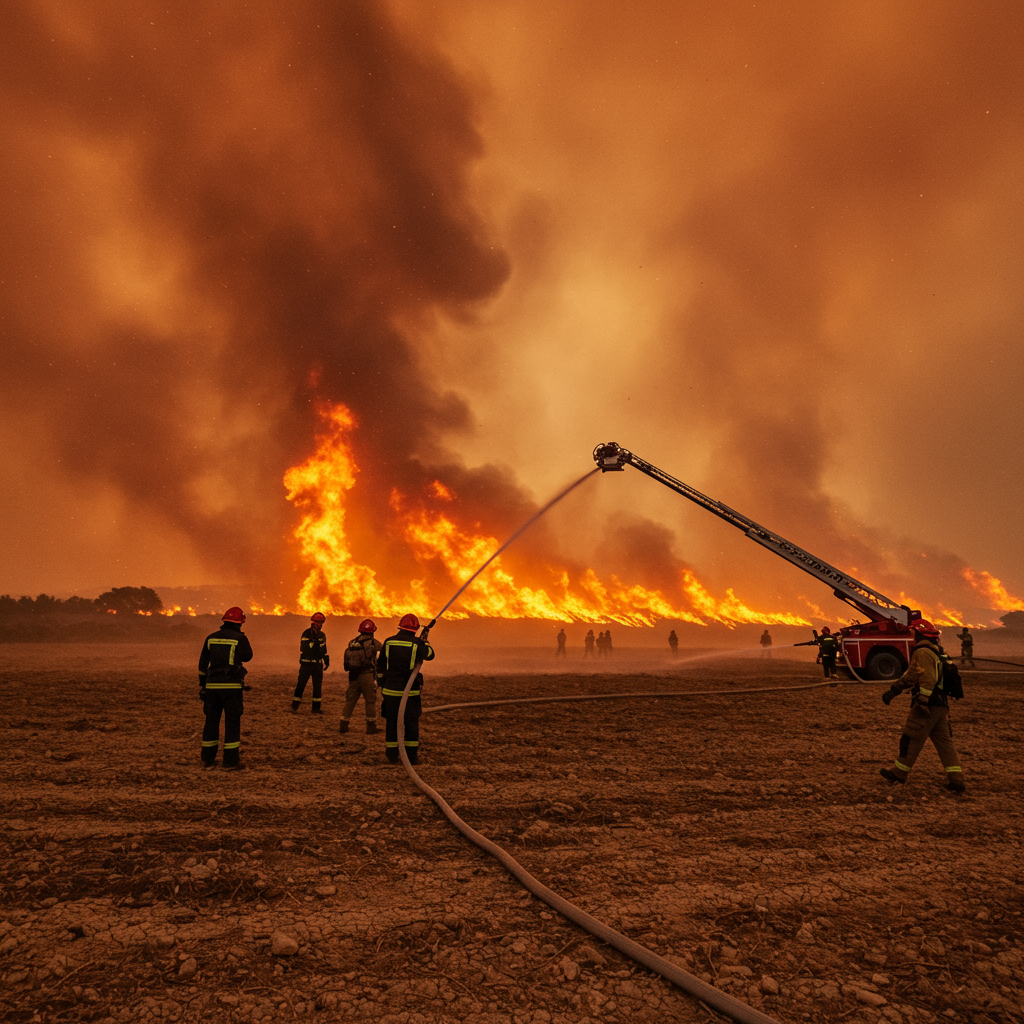Recent wildfires have tested emergency services and communities across the Mediterranean, with greece successfully containing major blazes while turkiye continues to battle active fronts, tragically reporting two fatalities. This period highlights the recurring challenge these regions face from summer fires, intensified by climatic conditions.
As wildfires erupted, immediate concerns focused on public safety and preserving property. Firefighting teams mobilized rapidly, facing difficult conditions often exacerbated by strong winds and dry vegetation. The scale of the response underscores the severity of these events.
Wildfire Situation Stabilizes in Greece
Significant progress has been made in Greece to bring destructive wildfires under control. Authorities reported successful containment of major blazes that threatened populated areas and disrupted daily life in southern Crete and near the capital, Athens. Crucially, no casualties were reported in Greece, despite widespread evacuations and property damage.
Crete Wildfire Extinguished After Mass Evacuations
On the large southern island of Crete, a large wildfire near the resort town of Ierapetra prompted the urgent evacuation of approximately 5,000 people. This included both local residents leaving their homes and visitors vacating accommodation as flames advanced rapidly. Over 230 firefighters, supported by six helicopters, worked tirelessly on the ground and from the air to tackle the blaze. By Friday morning, officials confirmed that the active fire front had been extinguished.
However, helicopter operations continued in the area as a precautionary measure, aiming to prevent any potential flare-ups from smoldering hotspots. While no human injuries occurred, the fire caused damage to acres of forestland and impacted valuable olive trees. Efforts were immediately underway by local officials to coordinate the safe return of the thousands who had been displaced, reflecting a focus on quickly restoring normalcy for affected communities. The intensity of the blaze was such that some people, finding themselves trapped, were forced to flee towards the sea, where local fishermen and divers provided vital rescue support. Reports also tragically noted the discovery of dead farm animals, some reportedly perishing while still chained.
Rafina Fire Near Athens Brought Under Control
Elsewhere in mainland Greece, near the port town of Rafina, located about 30 kilometers (18 miles) east of Athens, another substantial fire fanned by strong winds was brought under control by Thursday evening. This incident necessitated the evacuation of around 300 people from the affected zone. Local authorities, including police, conducted door-to-door checks to ensure elderly residents received assistance during the evacuation process.
The Rafina fire caused destruction, damaging or destroying a few houses and multiple vehicles. Furthermore, it significantly disrupted ferry services connecting Rafina to tourist islands situated in the western Aegean Sea, impacting travel plans for many. Despite the fire being under control, firefighting crews remained on high alert. Persistent strong winds in the region posed a continued risk of reignition, necessitating ongoing monitoring and readiness.
Elevated Wildfire Risk Ahead as Heatwave Approaches Greece
While Greece had temporarily been spared the most intense heatwave conditions affecting other parts of Southern Europe, weather patterns were forecast to shift dramatically. Starting this weekend, temperatures across the country are projected to climb sharply. Forecasts indicate potential highs reaching up to 43 degrees Celsius (109 degrees Fahrenheit) in certain areas. This significant temperature increase, combined with dry conditions, is expected to substantially raise the overall risk of new wildfires igniting and spreading rapidly across the Greek landscape.
Turkiye Battles Ongoing Blazes and Records Fatalities
Across the border, neighboring Turkiye has faced a more challenging and tragic situation. While some fires are being contained, the country continues to contend with active fronts, and two deaths have been officially reported. These fatalities mark a somber point in the series of wildfires that have affected various parts of the country over the past week.
Two Die in Odemis Area Wildfire
Near the western town of Odemis, the battle against a fire tragically resulted in two deaths. One fatality was a local forestry worker who lost their life while actively engaged in efforts to contain the blaze. The second victim was an 81-year-old resident in the same area who died due to smoke inhalation. Authorities confirmed these as the first reported deaths in the recent wave of wildfires that have forced thousands of people to flee their homes across Turkiye. The loss of life underscores the extreme dangers faced by both emergency responders and vulnerable populations during these intense fire events.
Firefighting Efforts Intensify Near Cesme
In a separate incident, a large wildfire erupted near the Aegean coastal town of Cesme, a popular vacation destination situated about 190 kilometers (120 miles) west of Odemis. This fire, which began on Wednesday, required a massive response. Hundreds of firefighters were deployed to the scene, supported by aerial assets including aircraft and helicopters working to douse the flames from above.
The Cesme fire’s rapid spread necessitated urgent measures, leading to the evacuation of three nearby neighborhoods. Road closures were also implemented to ensure safety and facilitate emergency access. Television footage captured the dramatic scene of intense flames consuming dry vegetation right alongside a major highway, illustrating the speed and proximity of the threat posed by the fire.
Hundreds of Wildfires Challenge Turkiye Amid Harsh Conditions
Over the past week, Turkiye has been grappling with hundreds of wildfires across its territory. These blazes have been primarily fueled by a dangerous combination of strong winds, extreme heat, and exceptionally low humidity levels. The widespread nature and intensity of the fires have stretched resources and significantly impacted communities. Across the country, the fires have reportedly damaged or destroyed approximately 200 homes, leaving many families displaced and facing significant losses.
The Broader Context: Climate Change and Mediterranean Wildfires
The occurrence of wildfires during the hot, dry summer months is not unusual for Mediterranean countries like Greece and Turkiye. Historically, this time of year presents conditions conducive to ignition and rapid fire spread. However, the increasing frequency, intensity, and unpredictability of these blazes are raising alarm among experts.
Leading scientists and environmental observers warn that climate change is playing a significant role in exacerbating wildfire risks in the region. Rising global temperatures contribute to hotter, longer dry spells and more intense heatwaves, creating ideal conditions for fires to start and spread uncontrollably. Changes in weather patterns, including stronger winds during critical periods, further complicate firefighting efforts and increase the destructive potential of blazes.
Turkiye’s Climate Actions and Vulnerability
In recognition of the growing threat posed by climate change, Turkiye has taken steps towards addressing its environmental impact. The country’s parliament recently adopted a landmark climate law, setting a target for net-zero emissions by 2053. This legislation includes provisions for establishing a carbon market board intended to oversee efforts aimed at reducing greenhouse gas emissions.
Despite these policy initiatives, experts emphasize that Turkiye, as a Mediterranean nation, remains particularly vulnerable to the impacts of climate change. The country is facing a higher likelihood of searing heatwaves, prolonged droughts affecting water resources and vegetation, increased frequency of floods, and other extreme weather events. These changing conditions create a challenging environment, making effective wildfire prevention and management increasingly critical and complex. The current wildfires serve as a stark reminder of this ongoing vulnerability and the urgent need for both mitigation and adaptation strategies.
Looking Ahead: Preparedness and Resilience
As the Mediterranean region heads deeper into its summer season, the risk of further wildfires remains high. Authorities in both Greece and Turkiye continue to monitor conditions closely and maintain a state of readiness. The events of the past week highlight the importance of public awareness, early warning systems, and robust emergency response capabilities. Building resilience in communities and landscapes prone to fires is a long-term challenge that requires sustained investment and collaboration.
Frequently Asked Questions
What were the main impacts of the recent wildfires in Greece?
Recent wildfires in Greece, specifically on Crete near Ierapetra and mainland near Rafina, led to significant impacts. The Crete fire necessitated the evacuation of approximately 5,000 people but resulted in no human casualties, although it burned forest and olive trees. The Rafina fire near Athens led to 300 evacuations, destroyed houses and vehicles, and disrupted ferry services to Aegean islands. Both fires required extensive firefighting efforts but were brought under control without loss of life in Greece.
Where did the deadly wildfires occur in Turkiye?
The recent wildfires resulting in fatalities in Turkiye occurred near the western town of Odemis. One death was a forestry worker trying to contain the blaze, and the second was an 81-year-old resident who died from smoke inhalation in the same area. Separately, another major fire requiring large firefighting resources and evacuations was reported near the popular Aegean coastal town of Cesme.
How does climate change affect wildfire risk in regions like Greece and Turkiye?
Experts indicate that climate change significantly intensifies wildfire risk in Mediterranean regions such as Greece and Turkiye. Rising global temperatures contribute to hotter, longer periods of drought and more frequent, intense heatwaves. These conditions dry out vegetation, making it easier for fires to ignite and spread rapidly. Changes in wind patterns also exacerbate the challenge for firefighting crews, increasing the destructive potential of blazes and making summer wildfires a more severe annual threat.
—
The successful containment of major wildfires in Greece offers a measure of relief, particularly the avoidance of casualties in areas like Crete and Rafina which saw mass evacuations. However, the ongoing battle against fires in Turkiye, marked by the tragic loss of two lives, serves as a stark reminder of the persistent dangers. As both nations face forecasts of rising temperatures and continued dry conditions, the focus remains on vigilance and preparedness. The connection between these escalating wildfire events and the broader impacts of climate change underscores the critical need for both immediate response strategies and long-term environmental policies in this vulnerable region.




